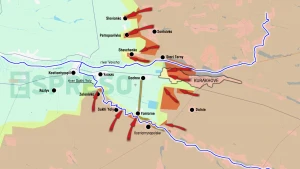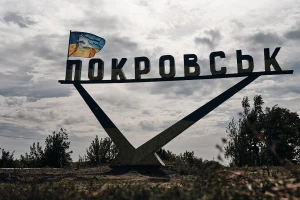
ISW: Occupiers overestimate their military capabilities to advance in Donetsk region
Kremlin officials, Moscow puppets and Wagner's PMC financier exaggerate the Russian military's ability to advance in the Donetsk region and on the battlefield in general
This was reported by the Institute for the Study of War (ISW)
Analysts recall that the leader of the so-called Donetsk People’s Republic Denis Pushilin said that taking Bakhmut would allow Russia to advance to Kramatorsk and Slovyansk. He also claimed that the hypothetical capture of Vuhledar by the Russians would allow them to launch offensive operations on Kurakhove, Marinka, and Pokrovsk - despite the inability of Russian forces to capture Marinka since March 17, 2022, when the Russian Ministry of Defense falsely announced the capture of the settlement.
Yevgeny Prigozhin, the founder of the Wagner PMC, previously claimed that the average speed of Russian advance around Bakhmut was about 100 meters per day, and it took Russian troops 8 months to advance from the occupied Popasna, Luhansk Oblast, and Svitlodarsk to the current positions in the Bakhmut area (distances of 25 km and 22 km, respectively), it was said in the Institute.
Pushilin also claimed that Russian forces would capture Avdiivka, but did not provide any explanation as to how Russian forces would break through the nearly nine-year-old Ukrainian fortifications around the town.
"Pushilin’s expectations regarding the hypothetical capture of Bakhmut further demonstrate that the Russians continue to face problems in assessing the time and space adequately in terms of their military potential," the analysts explained.
Experts also noted that Russian regular troops may be replacing the exhausted forces of Wagner PMC, sending them to the front line in southern Ukraine from Bakhmut.
According to experts, the Russian Ministry of Defense may be trying to completely dislodge Wagner PMC forces near Bakhmut and present the Russian military command structure as the only winner around Bakhmut, assuming Russian forces eventually take the city.
Key findings of ISW
▪ The introduction of Russian regular troops to the Bakhmut front delayed the culmination of Wagner Group's attack on the city. The ISW prediction made on December 27 that the Russian offensive on Bakhmut had reached its climax turned out to be inaccurate
▪ ISW considers it extremely unlikely that Russian troops will be able to quickly encircle Ukrainian forces in Bakhmut
▪ Russian regular troops can replace the exhausted forces of Wagner PMC by redeploying them from Bakhmut to the front line in the Zaporizhzhia region
▪ Ukrainian officials and ISW experts agree on the imminent offensive of Russian troops in the months to come. Analysts also suggest that Ukrainian forces are planning to launch a larger-scale counteroffensive
▪ Famous Russian military bloggers continue to expose Russia's military failures in Ukraine more explicitly
▪ Russia continues to use anti-terrorism laws to justify domestic repression
▪ Russian invaders continued attacks to recover lost positions along the Svatove-Kreminna line on January 31, as well as offensive operations along the front line in Donetsk region
▪ It is unlikely that Russian troops will receive significant advantages from a local offensive around Vuhledar in other parts of Eastern Ukraine
▪ Russian occupiers most probably are prioritizing sabotage and reconnaissance activities in the South of Ukraine, not the territorial gains
▪ Russian Prosecutor General Igor Krasnov acknowledged the failure of Russian mobilization, claiming that problems in its implementation are solved
▪ The Russian occupation authorities continue to involve the youth and impose educational programs to force social control over the occupied territories
- News













































